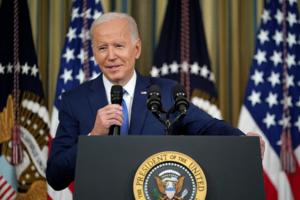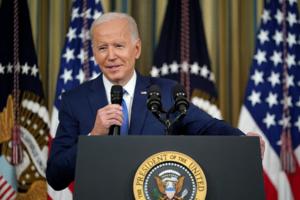Current News
/ArcaMax

Biden mulls tariff break for solar modules from Mexico
The Biden administration is mulling exempting Mexico from tariffs on imported solar equipment, a last-minute change that would primarily benefit Maxeon Solar Technologies Ltd.
The exemption being weighed by senior officials in the waning weeks of Joe Biden’s presidency was described by people familiar with the matter who asked not to be ...Read more
Iceland's Social Democrats reach deal for new government
Iceland’s new ruling coalition agreed on a platform of budget restraint to fight inflation and a referendum on continuing European Union entry talks.
Following negotiations since early December, the election-winning Social Democrats on Saturday signed a government deal with the center-right Liberal Reform Party and the People’s Party that ...Read more

Trump's 'culture defender' set to remake DOJ civil rights unit
WASHINGTON — The civil rights division of the Justice Department has for decades protected the rights of racial, ethnic and religious minorities, as well as women — the groups that have been the most common victims of illegal discrimination in the U.S.
President-elect Donald Trump’s choice to lead the office, Harmeet Dhillon, has a very ...Read more

Judge rules San Diego Humane Society's policy of returning cats to community violates law
SAN DIEGO — The San Diego Humane Society’s policy of turning away domesticated cats roaming outside and instead returning them back to where they were found without ensuring they have a caretaker violates the law, a judge ruled Friday.
San Diego Superior Court Judge Katherine Bacal’s decision following a bench trial is a victory for the ...Read more

Trump demands Panama lower transit fees or return canal to US
WASHINGTON — President-elect Donald Trump said Saturday that the Panama Canal is charging “exorbitant prices and rates of passage” on U.S. naval and merchant ships, and he demanded that fees be lowered or else Panama should return the canal to the U.S.
“The fees being charged by Panama are ridiculous, especially knowing the ...Read more

Orlando man pleads guilty to anti-Israel bomb threats, attack on solar facility
ORLANDO, Fla. — A Jordanian citizen living in Orlando pleaded guilty Friday to vandalizing a solar energy facility and threatening to bomb businesses that support Israel, the Department of Justice disclosed in a high-profile announcement.
Hashem Younis Hashem Hnaihen, 44, pleaded to four counts of threatening to use explosives and one count ...Read more

The end of a contentious chapter in CPS history: CEO Pedro Martinez's milestones and demise
CHICAGO — Chicago Public Schools CEO Pedro Martinez was fired late Friday night, clearing the way for Mayor Brandon Johnson to install a new leader of the nation’s fourth-largest school district after a protracted power struggle.
His termination was the fallout of a long fight between leaders of the Chicago Teachers Union aligned with the ...Read more

President Joe Biden gives federal employees Christmas Eve off
President Joe Biden is giving federal employees a parting gift this holiday season, saying in an executive order that this year’s Christmas Eve would be considered a federal holiday.
In the order, signed Thursday, Biden — who is in the final weeks of his tenure in the White House — said the extra day off would be given to all federal ...Read more

Norovirus is rampant in Florida. Blame oysters, cruise ships and holiday travel
FORT LAUDERDALE, Fla. — Tis the season to wash your hands and watch what you eat.
Norovirus, a vomit- and diarrhea-inducing stomach bug, is sickening Floridians through tainted surfaces and contaminated shellfish.
The Sunshine State is one of 12 in the U.S. with a high number of confirmed outbreaks of the virus. Anyone suffering from a bout ...Read more

California man arrested on suspicion of beheading 1-year-old son, authorities say
LOS ANGELES — A Sacramento County father has been arrested on suspicion of beheading his 1-year-old son, sheriff's officials said.
Andrey Demskiy, 28, was arrested and booked Friday on felony charges of murder, assault by means of force likely to produce great bodily injury, and corporal injury on a spouse in connection with the child's death...Read more

Clemency granted for Patty Prewitt, Missouri woman convicted of husband's 1984 murder
KANSAS CITY, Mo. — Missouri Gov. Mike Parson commuted the sentence of Patricia Prewitt, who had spent 40 years behind bars for her husband’s 1984 murder, among other reduced sentences and pardons announced Friday.
Prewitt, 75, has maintained her innocence while serving a life-sentence for the killing. For years, lawyers and advocates have ...Read more

Millions to get bigger Social Security checks If Biden signs new bill
WASHINGTON — Millions of Americans may see their Social Security benefits increase under a bill headed to President Joe Biden’s desk — though critics warn that the measure comes at the cost of pushing the fund further toward insolvency.
If signed by the president before the new Congress convenes on Jan. 3, the law would boost Social ...Read more

Lawyer for SC death row inmate unprepared, 'infected' with racism, appeal says
COLUMBIA, S.C. — A South Carolina man who is expected to be the next person scheduled for execution has filed an appeal with the South Carolina Supreme Court, alleging that prosecutors withheld crucial evidence about witnesses and his own lawyer, “infected by his own racism,” did not adequately defend him.
Marion Bowman Jr. was convicted ...Read more

Southern California men indicted in alleged $22 million crypto fraud case
LOS ANGELES — Two 23-year-old Southern California men have been indicted for allegedly defrauding investors out of more than $22 million in cryptocurrency, according to authorities.
Gabriel Hay of Beverly Hills and Gavin Mayo of Thousand Oaks are accused of collecting investments for nonfungible tokens, or NFTs, and digital asset projects ...Read more

NYC hotel at center of Ingrid Lewis-Martin bribery indictment won permits after she stepped in
NEW YORK — The operators of a luxury hotel in lower Manhattan wanted to remodel their lobby, but the city’s Department of Buildings stood in the way, voicing concern that the building’s existing certificate didn’t allow for the proposed renovations.
Enter Ingrid Lewis-Martin, Mayor Eric Adams’ recently resigned — and now indicted �...Read more

Snow covers New York City on first day of winter, frigid temps to follow
NEW YORK — Winter is here and so is the white stuff.
Snow blanketed New York City early Saturday morning, ushering in the first official day of winter in a truly frosty fashion. Flurries first started to fall across the tristate area on Friday, fluctuating between flakes and rain for much of the day before transitioning to more steady snow ...Read more

Trump taps 'Apprentice' creator Mark Burnett as special UK envoy
WASHINGTON — President-elect Donald Trump named Mark Burnett — the man who created the television show "The Apprentice" that helped catapult him to the presidency — as a special envoy to the U.K.
“With a distinguished career in television production and business, Mark brings a unique blend of diplomatic acumen and international ...Read more

NYPD Chief of Department Jeffrey Maddrey resigns amid bombshell sex abuse, harassment claims
NEW YORK — NYPD Chief of Department Jeffrey Maddrey resigned abruptly Friday night amid bombshell allegations from an NYPD lieutenant who accused him of predatory sexual harassment and forcing her to perform “unwanted sexual favors” in return for overtime pay, the Daily News has learned.
Quathisha Epps claims Maddrey repeatedly demanded ...Read more

Commercial Dungeness crab season to open along portion of California coast
SACRAMENTO, Calif. — The California Department of Fish and Wildlife announced that the commercial Dungeness crab fishery south of the Mendocino-Sonoma county line will officially open early next month.
Fishing Zones 3, 4, 5 and 6, which stretch to the U.S.-Mexico border, will open Jan. 5 at 12:01 a.m., with pre-soak beginning Jan. 2 at 8:01 a...Read more

Mega Millions jackpot nears $1 billion ahead of Christmas Eve drawing
NEW YORK — Mega Millions players dreaming of a green Christmas could be in luck this year.
Lottery officials on Saturday said no tickets matched all six numbers pulled Friday night, which means the pot has swelled from $825 million to nearly $1 billion. It marked the 29th consecutive drawing without a big winner, stretching all the way back ...Read more
Popular Stories
- Employers press Congress to cement health price transparency before Trump's return
- Will new year, new law bring new trouble for Orlando's homeless?
- Immigration drives nation's population growth
- Can Cuba and Venezuela help rescue Haiti? Head of US-backed transition is asking
- Modi's year of setbacks leaves India vulnerable in perilous 2025





